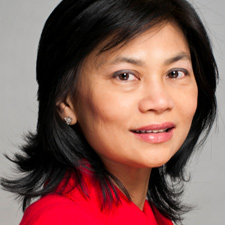This month’s Member Spotlight

Camille Greene
December 2016
Camille Greene, Corporate Marketing Services Director, Campofrio
I have had almost 25 years of experience in marketing which spans two continents, Asia and Europe. As Corporate Marketing Services Director for Campofrio Food Group (with its head office in Madrid), one of the biggest packaged meat companies in the world, my main responsibility is to equip the marketing teams of the various interdependent operating companies in Spain, Portugal, Italy, France, Belgium, The Netherlands and Germany with the best possible marketing processes, tools and techniques, oversee the planning of marketing investments by country and initiate and coordinate the preparation of brand and marketing strategies for the group that are aligned with the achievement of the annual operating plan.
Why is diversity important for you?
Today, diversity in the workplace has become a necessity because global markets are emerging and there is a need to understand the perspectives of different cultures, genders, generations and backgrounds. Ways of working vary and demographics are changing, and we need to learn more from each other. In my role as Corporate Marketing Services Director, I have to work with various countries on topics which can be debatable most of the time. A case in point is how we manage innovation or the launch of new packaged meat foods at a European level. It becomes a real challenge because marketing teams from our various regions have distinct opinions on how consumers perceive or behave towards one and the same product concept. Therefore launching the same product for example in Spain and France means very different executions or positionings at times. Therefore, from a corporate standpoint, understanding these diverse points of views becomes fundamental.
What is your history at LEAD? Your perspective on LEAD and what advice would you have for us?
Thanks to Mick, I am a charter member of LEAD. I wish I had more time to participate in the activities! I very much enjoyed the meetings we had at the Unilever offices in Rotterdam and the meeting in London. I think that LEAD should continue to champion diversity by creating leaders within the organizations that can truly “LEAD”, “CHAMPION” and more importantly “SUSTAIN” its mission.
When we launched LEAD several years ago, our vision and mission, as I recall, was fostering gender diversity in the workforce. I think we have evolved or we are evolving to a more all-encompassing definition of diversity – and I believe this is great. The challenge though is how to be more visible in this aspect. Could we form partnerships with companies who consider diversity just as important as corporate social responsibility? Could we have some annual awards to recognize companies who champion diversity based on the metrics we set?
Tell us about something innovative you’ve done recently related to diversity?
In many small ways and on an everyday basis, I try to strengthen my ability to be a champion of diversity both on a personal and a professional level. I am a Filipina, having worked most of my early years in the east (the Philippines) and during my later years in the west (Spain), with strong personal ties to the United States where my family resides. This has been a tremendous advantage for me in my role as Corporate Marketing Services Director covering 7 countries in Europe, not to mention the needed frequent collaboration with Mexico where our head office is located. I say tremendous advantage because I can relate to different cultures with ease and transform difficult or challenging problems to win-win situations with visible results for the company. This year, I would say my biggest achievement was launching within the group a common methodology to track product quality – something which has always been a sensitive issue between Marketing teams and R&D. In order to overcome the inevitable resistance to the implantation of this new process, I set up a task force which helped us first and foremost understand the biases towards this issue and by having a keen perception of what the concerns were, the challenge became so much easier as each team felt they were represented.
How important is diversity within your organization? Do you have metrics in place to measure diversity or which KPIs do you maintain?
In 2009 when Campofrio Food Group was officially created as a new company, it kept diversity at the heart of its core values. Through the years, our company has truly “walked the talk”.
We have a very diverse workforce in terms of gender, age, culture and backgrounds and our company employs both quantitative and qualitative measurements to evaluate the effect of diversity on business results.
For the quantitative metrics, we employ surveys within the company to measure employee satisfaction and employee perception towards the company’s business goals and its commitment to its core values – diversity being at the top of the list. In addition, since we are an FMCG company, we measure our “diversity” in terms of our being able to penetrate new markets, particularly through export. Meat products are usually perceived as highly local, with consumers having regional preferences that makes it difficult to introduce new tastes and flavours. So far, we are proving this wrong. By having diverse marketing and R&D teams within our organization, we are able to understand better how we can launch the same products in more than one country. This clearly is a diversity metric that translates to our ROI.

What is your biggest achievement related to diversity?
I would say it is my ability to adapt to working in Europe after having worked for 18 years in Asia. It has been a personal challenge adjusting to a new work environment and learning a new language – Spanish. When I started working in Spain in 2003, the management committee in my company was composed mostly of men. This was a big surprise to me as in the Philippines it was the opposite.
Being a woman, being Asian and being new to the culture (especially challenging when you are a marketing person), were the difficulties I had to overcome on a daily basis. In the beginning, it was difficult for me to adjust as I tried to “learn” to be like everyone else instead of showing the everyone what I could contribute in light of my different background. I was not leveraging the “diversity” that I could bring to the teams. It wasn’t until I was empowered to share my 18 years of marketing experience from an emerging market that I realized that there was a lot of value I could add and that the majority of the people are willing and eager to learn .



